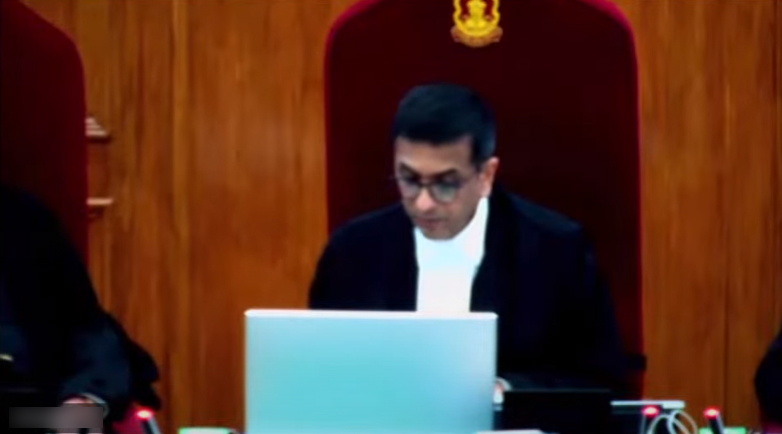New Delhi: The Supreme Court on Wednesday held that the Centre has the power to extend the services of incumbent Chief Secretary of Delhi Naresh Kumar for a period of six months.
“We have come to the conclusion that at this stage…..the decision of the Union Government to extend the services of incumbent Chief Secretary for a period of six months, cannot be construed to be violative of law or constitutional distribution of power between the Union and the government of NCT of Delhi,” noted a Bench presided over by CJI DY Chandrachud in its order.
The Bench, also comprising Justices JB Pardiwala and Manoj Misra, clarified that its analysis is limited to the “prima facie evaluation of the case at the present stage” without entering into any conclusive determination of the issues which are pending for adjudication before the Constitution Bench.
It reasoned that the post of Chief Secretary is entrusted with significant functional responsibilities, including overall administration of land, police and public order – subjects which stand excluded from legislative and executive domain of the Government of NCT of Delhi.
The Bench also referred to Rule 55(2) of the Transaction of Business of the Government of NCT Delhi Rules, 1993 which requires that LG must make a prior reference to the Central Government for appointment of Chief Secretary, Commissioner of Police, Secretary of Home and Land.
It added that the recent Supreme Court judgment had given control over ‘services’ to the elected government except for land, police and public order and the Delhi Government’s plea against contentious law giving the LG an upper hand in matters related to transfers and postings of senior officials is pending before a 5-judge Constitution Bench.
The top court said that prima facie it will be “far-fetched” to postulate that the Centre is divested with the power to appoint the Chief Secretary of Delhi in view of the provisions contained under Section 45A (d) of the National Capital Territory of Delhi (Amendment) Act, 2023.
During the hearing, Senior Advocate Abhishek Manu Singhvi, who appeared on behalf of the Delhi Government, contended that the two Constitution Bench judgments rendered by the Supreme Court had held that there should be “participation” of the elected government in decisions taken by the LG. Singhvi added that L-G should act on “aid and advice of the elected government.”
He said that in the last 30 years of the inception of the NCT of Delhi, no extension was ever given to any Chief Secretary, questioning the Centre’s intent to extend the tenure of the incumbent Chief Secretary of Delhi Naresh Kumar.
He added that Rule 16 of All India Services (Death-cum-Retirement Benefits) Rules, 1958 explicitly provides that an extension can be granted to the Chief Secretary for a period not more than six months on the recommendations made by the concerned “state government” with full justification and in public interest with the prior approval of the Central Government and no extension can be granted “unilaterally” by the Union Government.
Singhvi submitted that the proposed extension sought to be granted to the incumbent Chief Secretary is without the “authority of law”.
Solicitor General (SG) Tushar Mehta, appearing for the Centre, said that extension of Chief Secretary is not something “extraordinary”. “A statement could be recorded that extension (of incumbent Chief Secretary) will be for six months and after that we will abide by your lordships orders, whatever is decided,” said SG Mehta.
He highlighted that Chief Secretaries of West Bengal, Rajasthan, Madhya Pradesh and Uttar Pradesh were given extension after attainment of superannuation in the past 12 months.
SG Mehta said that in 2015, Deepak Mohan, then Chief Secretary of Delhi was granted an extension, adding that in the last ten years, 57 such extensions were given to Chief Secretaries of different states.
He said that the recently-introduced section 45A in the Government of National Capital Territory of Delhi Act, 1991 recognises the power of the Central government to appoint the Chief Secretary, adding that in case of AGMUT cadre – which is a joint cadre – relevant authority for granting extension will be the “Central government.”
On Tuesday, the Supreme Court had asked SG Mehta to show the provisions or rules empowering the Union Government to extend the tenure of Kumar – Delhi’s top-most bureaucrat — who is due to superannuate on November 30.
“Right now, the Centre intends to extend the tenure of the existing person for a limited period,” Mehta submitted, clarifying that the Centre “will not extend the tenure for three or four years.”
The plea filed by the Delhi Government had pleaded that it was always ‘exclusively’ the elected government which appointed the Chief Secretary.
In an earlier hearing, the Supreme Court in a bid to give a “workable solution” had asked the Union Government to give the list of five senior bureaucrats and the Delhi Government may “pick one name” out of those suggested by the Centre.
It had said that doing so would meet the “concerns of the Union Government” and at the same time, “foster a degree of confidence in the officer in the elected arm of the state”.
–IANS


Comments are closed.